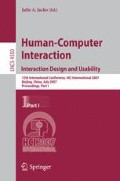Abstract
Cognitive Load, as an indicator of pressure on working memory during task performing, attracts more and more research interests in recent years. By correctly measuring cognitive load levels, the system can adjust task procedure to maintain the cognitive load in an acceptable range; therefore, the subject can execute tasks more accurately and efficiently. Among many different cognitive load measuring approaches, speech-based measurement is effective due to its non-intrusive nature and possibility of online measurement. Most existing research on speech-based cognitive load measurement is based on manually extracted features, which prevent practical use. In this paper, some potential speech features, such as rate of pauses and rate of pitch peaks are investigated and proved to be effective. All feature extraction is based on automatic algorithm.
Access this chapter
Tax calculation will be finalised at checkout
Purchases are for personal use only
Preview
Unable to display preview. Download preview PDF.
References
Mousavi, S.Y., Low, R., Sweller, J.: Reducing Cognitive Load by Mixing Auditory and Visual Presentation Modes. Journal of Educational Psychology 87(2), 319–334 (1995)
Sweller, J., Merrienboer, J.J.G.v., Paas, F.G.W.C.: Cognitive Architecture and Instructional Design. Educational Psychology Review, 10(3) (1998)
Paas, F., Merrinboer, J.J.G.v.: Instructional Control of Cognitive Load in the Training of Complex Cognitive Tasks. Educational Psychology Review 6, 5171 (1994)
Kahneman, D.: Attention and Effort. Prentice Hall, New Jersey (1973)
Gevins, A., Smith, M.E.: Neurophysiological Measures of Working Memory and Individual Differences. In: Cognitive Ability and Cognitive Style Cerebral Cortex, vol. 10(9), pp. 829–839 (2000)
Scerbo, M.S., et al.: The Efficacy of Psychophysiological Measures for Implementing Adaptive Technology. NASA Langley Research Center, Hampton (2001)
Roscoe, A.H.: Assessing Pilot Workload. Why measure heart rate, HRV and respiration? Biological Psychology (34), 259–287 (1992)
O’Donnell, R.D., Eggemeier, F.T.: Workload Assessment Methodology. In: Cognitive processes and performance, vol. 42, pp. 1–49. Wiley, New York (1986)
Zijlstra, F.R.H., Doorn, L.v.: The construction of a scale to measure perceived effort. Department of Philosophy and Social Sciences. Delft University of Technology, Delft, Netherland (1985)
Hart, S.G., Staveland, L.E.: Development of NASA-TLX (Task Load Index): results of empirical and theoretical research. Human Mental Workload, pp. 139–183. North-holland, Amsterdam (1988)
Kettebekov, S.: Exploiting Prosodic Structuring of Coverbal Gesticulation. In: ICMI 2004, State College, PA, USA (2004)
Berthold, A., Jameson, A.: Interpreting Symptoms of Cognitive Load in Speech Input. In: UM 1999 (1999)
Müller, C., et al.: Recognizing Time Pressure and Cognitive Load on the Basis of Speech: An Experimental Study. In: UM 2001 (2001)
Jameson, A., et al.: Assessment of a User’s Time Pressure and Cognitive Load on the Basis of Features of Speech. Journal of Computer Science and Technology (2006)
Oviatt, S., Coulston, R., Lunsford, R.: When Do We Interact Multimodally? Cognitive Load and Multimodal Communication Patterns. In: ICMI 2004, State College, Pennsylvania, USA (2004)
SPSS Inc. http://www.spss.com
Author information
Authors and Affiliations
Editor information
Rights and permissions
Copyright information
© 2007 Springer-Verlag Berlin Heidelberg
About this paper
Cite this paper
Yin, B., Chen, F. (2007). Towards Automatic Cognitive Load Measurement from Speech Analysis. In: Jacko, J.A. (eds) Human-Computer Interaction. Interaction Design and Usability. HCI 2007. Lecture Notes in Computer Science, vol 4550. Springer, Berlin, Heidelberg. https://doi.org/10.1007/978-3-540-73105-4_111
Download citation
DOI: https://doi.org/10.1007/978-3-540-73105-4_111
Publisher Name: Springer, Berlin, Heidelberg
Print ISBN: 978-3-540-73104-7
Online ISBN: 978-3-540-73105-4
eBook Packages: Computer ScienceComputer Science (R0)

